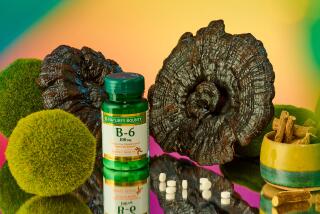Alcohol’s at Root of Brouhaha Over Caribbean Tonic Drinks
- Share via
MIAMI — In much of South Florida’s Caribbean community, the effects of traditional pick-me-up tonics such as Lion Roots and Tiger & Bone are well-known. Although the beverages are not labeled as alcoholic, so much fermentation goes on in some 8-ounce bottles that shopkeepers have seen the tops lift off.
“I would never sell those drinks to children,” said Andrea Dammar, assistant manager of Jamaican Groceries & Spices here.
But recovering alcoholic Michael Pettis said he didn’t know.
When he began quenching his thirst with Ashanti Original Jamaican Roots Drink, Pettis had been sober for seven years. Then one night he got stopped for speeding--and flunked a Breathalyzer test.
Now Pettis, 47, has fallen off the wagon, lost his driver’s license, been kicked out of welding school and is separated from his wife.
And Recardo Dixon, who for 20 years has been cooking up Ashanti from a blend of sarsaparilla, herbs and honey, has been arrested and charged with four alcohol violations.
State agents raided his Little Haiti warehouse last month and seized 1,000 gallons of his elixir. Most of the bottles tested by the state contained at least 3% alcohol, equivalent to a bottle of beer, agents said.
But Thomas F. Ryan, an attorney for Pettis, said other samples showed alcohol levels of up to 30%. “It’s like being slipped a mickey,” said Ryan of the drink’s kick.
The brouhaha over the brew has prompted varying reactions in the West Indian community. Leroy Robinson, owner of the Caribbean Juice Bar, said he sees the raid as an attack on West Indian culture, where home-brewing drinks from native roots is common. “It is believed that regular use of roots and herbs will promote general health and well-being,” reads the label on Ashanti drinks.
But others think that the drinks’ effects are more imaginary than real. “A lot of men use it for an aphrodisiac,” said Richard Woolward, owner of Kingston 6 Caribbean Products, a market in Pembrook Pines, Fla. “They say it works, but I always say it’s all in the mind.”
Woolward said he stopped carrying Ashanti products years ago because “my customers complained it was giving them headaches.”
According to Pettis, the drinks gave him much more than a headache.
In a lawsuit filed in West Palm Beach civil court, Pettis said that he began drinking Ashanti on a daily basis in 1995.
He was arrested in 1996 for drunk driving, but he beat the charge by arguing that he did not know he was drinking alcohol. Nonetheless, Pettis lost his driver’s license; although a jury found him unaware that he had been drinking, his blood-alcohol level indeed had been above the legal limit. And without his license, he lost his grant to attend welding school. “His personality changed and his marriage fell apart,” the lawsuit said.
Ryan said that his client is seeking unspecified damages of more than $15,000. “Ashanti violated all state statutes under alcohol and beverage control. It wasn’t properly labeled and he wasn’t paying taxes,” Ryan said of Dixon. “As a result, Pettis fell off the wagon and he’s still drinking.”
Dixon, 46, counters that he passed regular inspections by the state agriculture department and the federal Food and Drug Administration. “I’m very surprised by this,” he said. “I’m out of business right now.”
Dixon’s attorney, Michael Schwartz, said he has filed a motion to dismiss the charges, which include one felony count that could send Dixon to prison for more than a year.
Jack Dodson, an agent with the Florida division of Alcoholic Beverages and Tobacco, said Pettis’ suit led to Dixon’s arrest and a probe of other makers of roots drinks in South Florida.
“If they’re using the same ingredients, that causes fermentation unless they add some stabilizer to stop it,” Dodson said. “And then it’s on the shelf where anybody can get it, a 5-year-old, a 6-year-old, anybody.”
Times researcher Anna M. Virtue contributed to this story.
More to Read
Sign up for The Wild
We’ll help you find the best places to hike, bike and run, as well as the perfect silent spots for meditation and yoga.
You may occasionally receive promotional content from the Los Angeles Times.






